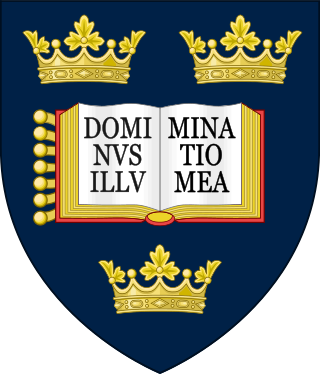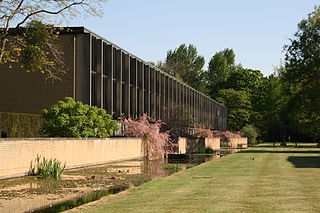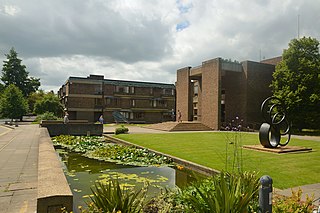
Richard Henry Tizard (25 June 1917 – 5 September 2005) was a distinguished engineer and founding Fellow of Churchill College, Cambridge. [1]

Richard Henry Tizard (25 June 1917 – 5 September 2005) was a distinguished engineer and founding Fellow of Churchill College, Cambridge. [1]
Dick Tizard was the son of Sir Henry Tizard. He was chosen by Sir John Cockcroft as a founding Fellow of Churchill College, a new science-focused college at the University of Cambridge. [2] He offered a fellowship to John Arundel Barnes. [3]
The 1960s were a period of student unrest and turbulence in academic governance. [4] [5] Tizard came from a family of high achievers with a productive stubborn streak. He used his political skills to marshal his grammar, state and public school intake behind a programme of historic renewal and reform in the University. In 1969, he led his colleagues to accept students into membership of the College Council and to admit women, the first Cambridge men's college to do so. [2] [6]
The same year, the Labour government's Representation of the People Act 1969 reduced the voting age to 18 years. [4] Under Tizard's guidance, in 1970 Churchill's student union, the Junior Common Room (JCR), inspired by the worldwide student democracy movement, led the National Union of Students (NUS) in taking the Cambridge Town Clerk to the High Court to overturn a 19th-century precedent that won students the right to vote in their university towns. [7]
As Senior Tutor, Tizard pioneered outreach, admitting 600 men from 300 schools. After his retirement, he discussed with non-resident members of the JCR the possibility of their extending this outreach activity to 30 primary schools. [2] [8] [9] [10]
Churchill College later named a room after him. [11]

The University of Oxford is a collegiate research university in Oxford, England. There is evidence of teaching as early as 1096, making it the oldest university in the English-speaking world and the world's second-oldest university in continuous operation. It grew rapidly from 1167 when Henry II banned English students from attending the University of Paris. After disputes between students and Oxford townsfolk in 1209, some academics fled north-east to Cambridge where they established what became the University of Cambridge. The two English ancient universities share many common features and are jointly referred to as Oxbridge.

The University of Cambridge is composed of 31 colleges in addition to the academic departments and administration of the central university. Until the mid-19th century, both Cambridge and Oxford comprised a group of colleges with a small central university administration, rather than universities in the common sense. Cambridge's colleges are communities of students, academics and staff – an environment in which generations and academic disciplines are able to mix, with both students and fellows experiencing "the breadth and excellence of a top University at an intimate level".

Stanley Baldwin, 1st Earl Baldwin of Bewdley, was a British statesman and Conservative politician who dominated the government of the United Kingdom between the world wars, serving as prime minister on three occasions, from May 1923 to January 1924, from November 1924 to June 1929, and from June 1935 to May 1937.

Lincoln College is one of the constituent colleges of the University of Oxford, situated on Turl Street in central Oxford. Lincoln was founded in 1427 by Richard Fleming, the then Bishop of Lincoln.

New College is one of the constituent colleges of the University of Oxford in the United Kingdom. Founded in 1379 by William of Wykeham in conjunction with Winchester College as its feeder school, New College was one of the first colleges in the university to admit and tutor undergraduate students.

Pembroke College, a constituent college of the University of Oxford, is located at Pembroke Square, Oxford. The college was founded in 1624 by King James I of England, using in part the endowment of merchant Thomas Tesdale, and was named after William Herbert, 3rd Earl of Pembroke, Lord Chamberlain and then-Chancellor of the University.

St Catherine's College is one of the constituent colleges of the University of Oxford. In 1974, it was also one of the first men's colleges to admit women. It has 528 undergraduate students, 385 graduate students and 37 visiting students as of December 2020, making it one of the largest colleges in either Oxford or Cambridge.

Trinity College is one of the constituent colleges of the University of Oxford in England. The college was founded in 1555 by Sir Thomas Pope, on land previously occupied by Durham College, home to Benedictine monks from Durham Cathedral.

Churchill College is a constituent college of the University of Cambridge in Cambridge, England. It has a primary focus on science, engineering and technology, but retains a strong interest in the arts and humanities.

University College, informally known as Castle, is a college of Durham University in Durham, England. Centred on Durham Castle on Palace Green, it was founded in 1832 and is the oldest of Durham's colleges. As a constituent college of Durham University, it is listed as a higher education institution under section 216 of the Education Reform Act 1988. Almost all academic activities, such as research and tutoring, occur at a university level.

Trevelyan College is a college of Durham University, England. Founded in 1966, the college takes its name from social historian George Macaulay Trevelyan, Chancellor of the University from 1950 to 1957. Originally an all-female college, the college became fully mixed in 1992.
Sir Henry Thomas Tizard was an English chemist, inventor and Rector of Imperial College, who developed the modern "octane rating" used to classify petrol, helped develop radar in World War II, and led the first serious studies of UFOs.

Van Mildert College is a college of Durham University in England. Founded in 1965, it takes its name from William Van Mildert, Prince-Bishop of Durham from 1826 to 1836 and a leading figure in the University's 1832 foundation. Originally an all-male college, it became co-educational in 1972 with the admission of female undergraduates.

The Representation of the People Act 1969 is an Act of the Parliament of the United Kingdom that lowered the voting age to 18 years. This statute is sometimes called the Sixth Reform Act.

Sir Vernon Bernard Bogdanor is a British political scientist, historian, and research professor at the Institute for Contemporary British History at King's College London. He is also emeritus professor of politics and government at the University of Oxford and an emeritus fellow of Brasenose College, Oxford.
The Tizard Mission, officially the British Technical and Scientific Mission, was a British delegation that visited the United States during World War II to share secret research and development (R&D) work that had potentially significant military applications. It received its popular name from the programme's instigator, Henry Tizard. Tizard was a British scientist and chairman of the Aeronautical Research Committee, which had orchestrated the development of radar.

A common room is a group into which students are organised in some universities, particularity in the United Kingdom, normally in a subdivision of the university such as a college or hall of residence, in addition to an institution-wide students' union. They represent their members within the hall or college, operate certain services within these institutions such as laundry or recreation, and provide opportunities for socialising. There are variations based on institutional tradition and needs, but classically the following common rooms will exist:

Captain Sir John Norman Ide Leslie, 4th Baronet, known locally as Jack Leslie, was the eldest son of Sir John Randolph Leslie, 3rd Baronet, and Marjorie Ide. He became the fourth baronet when his father died in 1971.

The University of Cambridge is a public collegiate research university in Cambridge, England. Founded in 1209, the University of Cambridge is the third-oldest university in continuous operation. The university's founding followed the arrival of scholars who left the University of Oxford for Cambridge after a dispute with local townspeople. The two ancient English universities, although sometimes described as rivals, share many common features and are often jointly referred to as Oxbridge. In 1231, 22 years after its founding, the university was recognised with a royal charter granted by King Henry III.
John Arundel Barnes FBA was an Australian and British social anthropologist. Until his death in 2010, Barnes held the post of Emeritus Professor of Sociology, Fellow of Churchill College. From 1969 to 1982, he held the post of Professor of Sociology at the University of Cambridge. Previous positions include faculty posts in social anthropology at the University of Sydney and the Australian National University in Canberra, He also was associated with Academy of the Social Sciences in Australia, University College London, St John's College, Cambridge, Balliol College, Oxford and the Rhodes-Livingstone Institute. Barnes was a student of Max Gluckman in the Manchester School.